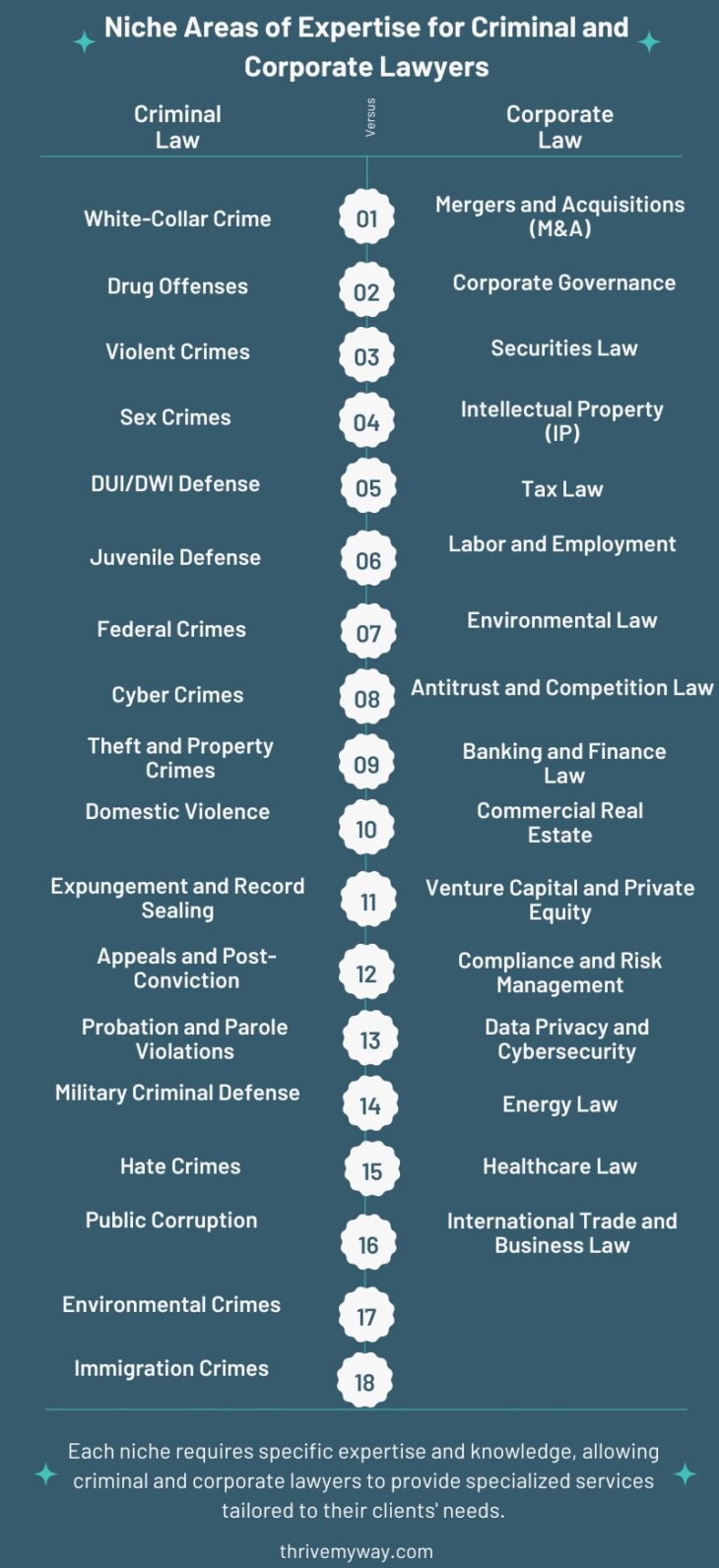So corporate law involves all the legal work needed for businesses – things like drafting contracts, handling taxes, ensuring compliance with regulations, and so on. The clients tend to be major companies with deep pockets, so you’d think the pay is probably pretty good. But I’ve heard it can also get tedious since a lot of it is just paperwork grinding.
Criminal defense, on the other hand, involves advocating for those accused of crimes. Money-wise, it may not always be super stable because payment depends on how many cases you get appointed or how your clients are doing financially. The same goes for personal injury lawyers. If you are not sure if that would be the right call, you can consult some of them, just check this website.
Now to get back to the differences between corporate and criminal defense. It’s never straightforward when it comes to comparing these two. That’s why a more detailed analysis is important. I will provide that in the following sections.
Table of Contents
ToggleEarnings and Career Suitability

Earnings potential can vary significantly in criminal law, impacted by factors like experience, reputation, and case complexity. Experienced criminal lawyers specializing in complex cases can earn substantial incomes. However, it’s important to note earnings may not always align with other fields like corporate law.
This is partly because criminal law demands specific skills and interests that don’t always transfer elsewhere. It requires a passion for advocating for the accused and a strong working knowledge of the criminal justice system. Lawyers must also be able to handle the emotional challenges of these cases.
For those truly passionate about criminal law, a fulfilling long-term career is possible, especially if one gains recognition in a specialized area. Corporate law generally provides a more predictable career path through legal and compliance advisory work, transactions, and client relationships within large law firms or businesses. This stability often translates to higher earning potential.
Overall, both fields offer opportunities, but criminal law demands a personal commitment more than most. Individuals should truly weigh their own strengths, values, and interests when deciding between these options to optimize their career fulfillment and success.
Focus on Client Service vs. Profit Generation

For criminal defense firms, focusing on excellent client services and ethical practices rather than pure revenue generation can still lead to strong financial success over the long term. Providing high-quality, transparent representation helps build a positive reputation in the community. This attracts more clients and complex cases that sustain the business.
Corporate law demands tend to emphasize maximizing profits by maximizing efficiency and client volume. Lawyers provide critical advisory services to businesses on complex compliance and transactional matters.
The high demand combined with the sensitive nature of such work often results in substantial compensation. Large firms especially rely on billable hours, client retention, and operational productivity to achieve financial targets.
Both models present viable approaches, but their proper application depends on factors like market forces, firm operations, and the nature of the legal work involved.
Prestige and Viability

Many view corporate law positively due to representing well-known companies, managing large transactions, and establishing career tracks at major firms. This reputation is strengthened by typically high earnings and stability.
However, criminal defense should not be seen as less prestigious simply due to clientele or case types. Those passionate about advocacy and civil rights may find this work deeply fulfilling. Successful criminal defense attorneys building strong reputations can achieve both personal satisfaction and financial security long term.
The sustained demand for criminal representation also ensures viable career opportunities for committed lawyers. While corporate law may provide a more defined path, those drawn to defense can absolutely thrive with dedication.
Specialization and Niche Markets

In criminal defense, selecting your niche like DUI, drug offenses, or white-collar charges allows developing expertise in serving those clients. Building a reputation through experience in similar cases means more referrals and negotiating higher rates.
Limiting your practice area also adds stability when public funds are tight, as specialists can target privately paying clients. Corporate attorneys see success through their specialized domains as well, whether mergers and acquisitions, intellectual property or regulatory compliance. Managing intricate deals and transactions demands premium knowledge which justifies top dollar fees.
Providing niche skills separates top pros from peers, driving demand. With demand comes the ability to support oneself and family.
Strategies for Enhancing Profitability

First, attract new clients through measured marketing, and retain those satisfied enough to return. Then maximize billable time and minimize office costs.
Whether guiding firms or fighting for rights, success hinges on strategy and efficiency. New times demand meeting clients online as much as office. Strong web presence and payment flexibility suit modern clients. Quality work proves itself, as reputation spreads the name far and wide.
Criminal lawyers especially gain sharing knowledge through digital channels. Explaining the law in everyday language helps folks understand rights. And clear pricing up front lets clients focus on cases, not scraping for change later. Backed by streamlined billing, cash flows are sure and steady as defense skills advance.
Financial Dynamics and Market Opportunities

The financial opportunities in corporate and criminal law can vary due to market demands in each field. Corporate law is lucrative thanks to growth in businesses globally and the need for supporting legal services.
Potential careers include positions at law firms both small and large, and in-house legal teams at companies, banks, and elsewhere. This exposure carries higher earning potential and mobility.
Market forces attracting corporate lawyers stem from requirements around commercial operations, mergers/acquisitions, and regulatory adherence at all levels. Criminal law offers specialized areas like forensics, cybersecurity, or criminology that can gain dedicated client expertise and experience.
Although salaries may differ, opportunities exist long-term for dedicated attorneys to build stable practices through specialization.
Conclusion
In summary, both corporate law and criminal defense offer financial prospects, but opportunities differ between the fields. Corporate law typically provides higher earnings potential and stability due to roles in major law firms, and companies, and its alignment with high-demand, high-revenue business operations.
Additionally, specializing within corporate law subfields like mergers and acquisitions can lead to significant income potential.



